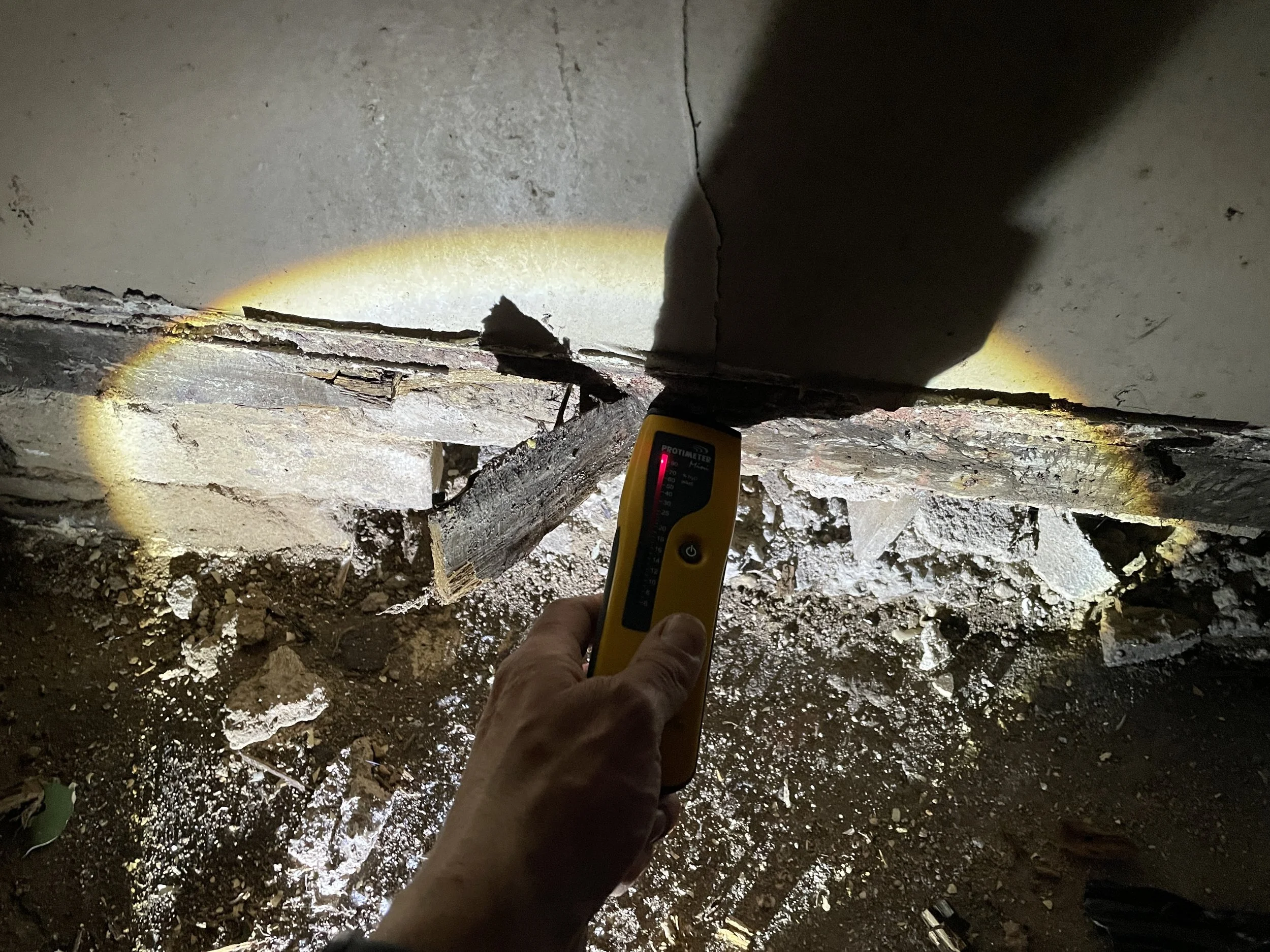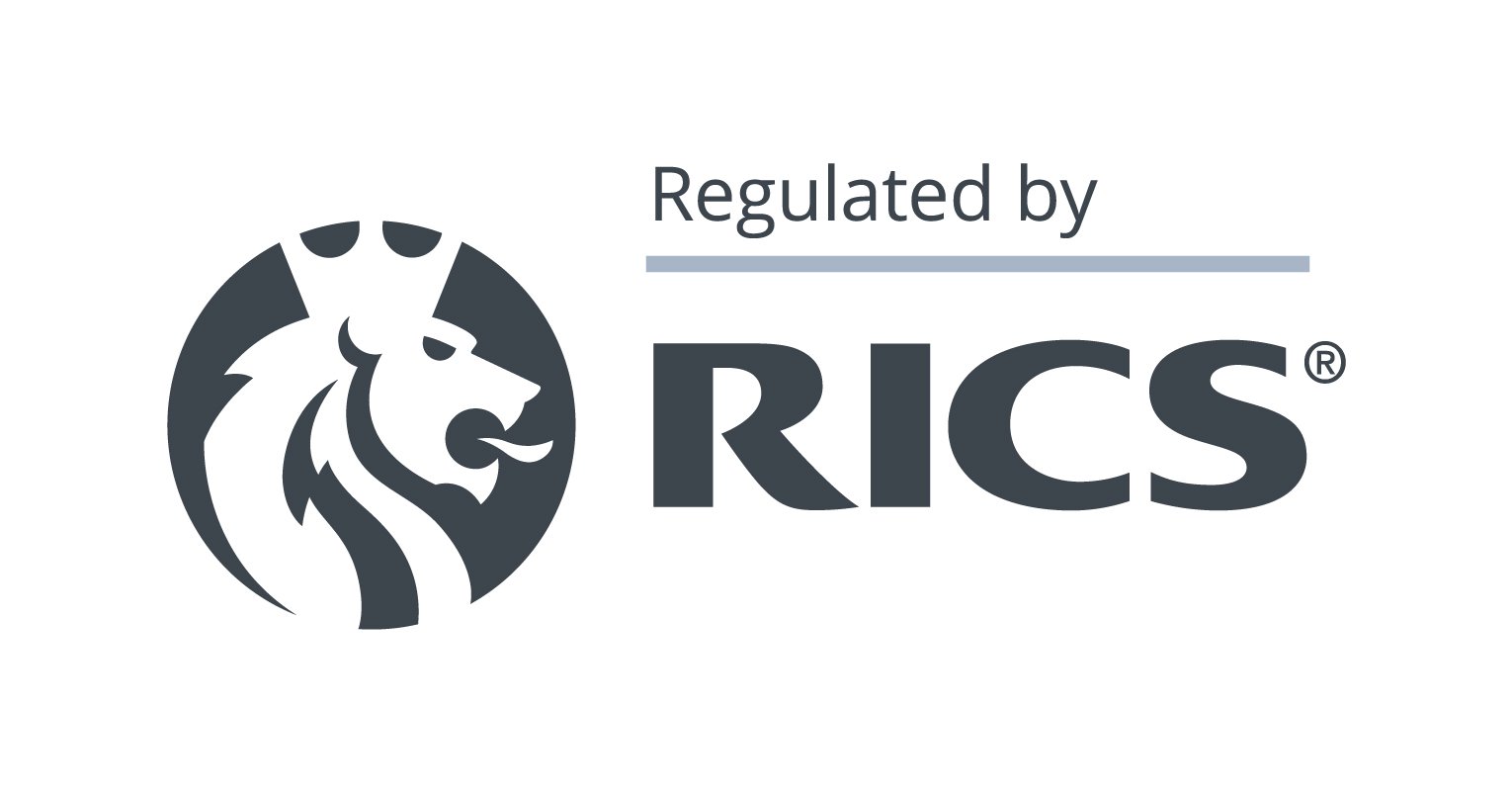Interstitial Condensation & Moisture Diagnostics
Not all damp problems are visible on the surface. In some cases, moisture occurs within the structure of a building itself, where warm indoor air meets cold external elements. This is known as interstitial condensation. Left unresolved, it can cause hidden decay, mould growth, and insulation failure.
We provide specialist building moisture diagnostics to identify interstitial condensation risks and other concealed moisture problems, using advanced survey methods and a structured process of elimination.
Because interstitial condensation happens within the building fabric, it is often hidden. Warning signs may include:
Persistent dampness despite surface treatments or repairs
Cold or damp finishes that don’t dry out
Localised mould or staining without obvious external defects
Decay of concealed timber elements (joists, rafters, sheathing boards)
Reduced thermal performance of insulation or roof build-ups
Typical Signs of Interstitial Condensation
Condensation and mould usually result from a combination of:
Inadequate or missing vapour control layers (VCLs)
Poor airtightness allowing warm, moist air into cold layers
Incorrect or poorly installed insulation causing cold bridges
Moisture build-up within flat roof or warm roof systems
High indoor humidity with low external drying potential
Design or retrofit defects in wall and roof assemblies
Common Causes We Diagnose
Moisture diagnostics is the detailed investigation of damp problems where the cause is not immediately obvious. Instead of guessing, we use a systematic process of elimination and specialist tools to understand how moisture is entering or forming within a building.
This can include interstitial condensation inside walls or roofs, rainwater leaks, plumbing defects, or trapped moisture in insulation.
The aim is to provide a clear diagnosis so you can take the right remedial action — not waste money on ineffective or unnecessary treatments.
What Do We Mean by Moisture Diagnostics?
How We Investigate
Diagnosing moisture problems is always a process of elimination. We begin with a non-destructive Stage 1 survey, gathering data and providing you with a clear written report. This report is issued before any further investigations are carried out.
Where complex or hidden issues are suspected, we may then recommend Stage 2 advanced diagnostics, such as data logging, laboratory testing, or WUFI hygrothermal modelling. These are only undertaken if required and always agreed with you first.
Stage 1 - Initial Damp Survey
Step 1 – Understand the Problem
We start by gathering background information:
Building design
Construction type
Occupancy
History of damp
This helps us target our inspection efficiently.
Step 2 – Initial Non-Destructive Inspection
We carry out a detailed internal and external inspection using:
Moisture profiling
Infrared thermography
Humidity and temperature checks
This first visit causes no damage — we use only existing access points such as loft hatches and ladders.
Step 3 – Report & Recommendations
We issue a clear, independent PDF report with:
Photographs and moisture maps
Likely causes of the interstitial condensation
Practical, prioritised recommendations
Recommended next steps if further testing is needed
This report gives you the information you need to take action — whether that’s instructing repairs or authorising further investigation.
Stage 2 - Optional Further Investigations
Where further evidence is required, we can provide:
Data logging of temperature and humidity over time to track dew-point conditions.
Interstitial condensation risk modelling using recognised methods, including subcontracted WUFI hygrothermal analysis for complex projects.
Borescope inspection of concealed cavities or roof build-ups.
Moisture probe monitoring for timber or insulation materials.
Laboratory testing of samples (salts, material moisture content, or mould spore analysis if relevant).
Stage 2 investigations are only recommended if needed and always agreed with you after Stage 1. For specialist WUFI modelling, we work with trusted building physics consultants and integrate their results into our reports.
Specialist PDF report with photographs, data outputs, and interpretation
Clear explanation of whether interstitial condensation is occurring, or if another defect is responsible
Risk assessment of current and future building performance
Practical recommendations for ventilation, insulation, or design improvements
Independent evidence for disputes, insurance claims, or refurbishment planning
What You Receive
Clear, Transparent Pricing
We believe in complete transparency.
You’ll know exactly what you’re paying for, with no hidden costs and no sales agenda.
Stage 1 – Initial Non-Destructive Survey & Report
From £495 (no VAT)
On-site inspection
Moisture mapping and photographic evidence
Independent PDF report with findings and recommendations
The Stage 1 report gives you clear next steps — whether that’s instructing repairs or moving on to Stage 2 testing. Moisture diagnostics is a more specialist level of survey, requiring advanced equipment, detailed analysis, and additional reporting time compared to standard damp surveys.
Stage 2 – Optional Further Investigations
Where further evidence is required, we can provide:
Data logging of temperature and humidity over time to track dew-point conditions.
Interstitial condensation risk modelling using recognised methods, including subcontracted WUFI hygrothermal analysis for complex projects.
Borescope inspection of concealed cavities or roof build-ups.
Moisture probe monitoring for timber or insulation materials.
Laboratory testing of samples (salts, material moisture content, or mould spore analysis if relevant).
Stage 2 investigations are only recommended if needed and always agreed with you after Stage 1. For specialist WUFI modelling, we work with trusted building physics consultants and integrate their results into our reports.
You’ll always receive a Stage 1 report first before authorising any Stage 2 works.
Pricing
Why Clients Trust Durndell Damp Surveys
With over 25 years of experience diagnosing damp issues in homes, historic buildings, and complex commercial properties, we bring unrivalled expertise to every survey.
As MRICS Chartered Building Surveyors, we follow RICS standards and always provide independent, evidence-based advice — never driven by sales targets or unnecessary treatments.
Why Choose Us
25 Years of Experience
We’ve spent decades investigating damp and water ingress problems across thousands of buildings — from modern homes to listed heritage properties and specialist environments like hospitals, schools, and laboratories.
This depth of experience means we quickly recognise patterns and causes that less experienced inspectors might miss.
Independent & Impartial Advice
Unlike contractors who offer “free surveys” in order to sell you chemical treatments or tanking, we don’t carry out remedial works.
Our role is purely diagnostic — giving you clear, honest advice on the true cause of the problem.
This protects you from unnecessary costs and ensures you only pay for what’s genuinely needed.
Regulated by RICS (Royal Institution of Chartered Surveyors)
As MRICS Chartered Building Surveyors, we are regulated by RICS, which guarantees that our inspections, reports, and advice meet strict professional and ethical standards.
Our surveys are also backed by professional indemnity and public liability insurance, providing complete peace of mind.
You’re protected by the highest level of professionalism and accountability in the industry.
Clear, Practical Reports You Can Act On
We provide reports that are easy to understand and actionable. Each report includes:
Photographs and moisture maps
A root cause diagnosis, not just symptoms
Prioritised remedial recommendations
Guidance your contractor can implement confidently
Whether you’re a homeowner or managing a large estate, our reports help you fix or manage the problem properly.
Local Knowledge
Based in Milton Keynes, we understand the typical building styles and materials found across the local area, from historic stone cottages to modern housing developments.
Areas We Cover:
We are based in Milton Keynes and typically cover properties within a 30–45 minute drive, including Buckingham, Towcester, Northampton, Bedford, Aylesbury, Leighton Buzzard, and surrounding towns and villages.
If you’re unsure whether we cover your location, please get in touch — we’ll be happy to advise.
FAQs
-
It’s moisture forming inside a building element (such as within a wall or roof), often unseen until materials decay or mould develops.
-
We use infrared thermography, moisture mapping, and data-logging to measure vapour pressure and dew-point conditions within structures.
-
Yes—especially in highly insulated or airtight buildings without proper vapour control or ventilation design.
-
Yes, advanced modelling can be arranged to predict interstitial moisture risk and inform design or retrofit decisions.
-
You’ll receive a detailed written report with moisture analysis, photographs, and independent recommendations for remedial action.
-
No — we are independent RICS surveyors. We provide impartial diagnosis and recommendations only, so you can appoint the right contractor with confidence.
Request a Interstitial Condensation & Moisture Diagnostics Survey Today
Request a Moisture Diagnostics Survey
If you are concerned about hidden damp, interstitial condensation, or unexplained moisture problems, contact us today. Our independent surveys provide clear answers and practical solutions you can trust.
Our independent, RICS-regulated surveys provide a clear diagnosis and practical advice you can trust. With over 25 years of experience, we’ll help you identify the true cause of penetrating damp and guide you through the next steps with confidence.








